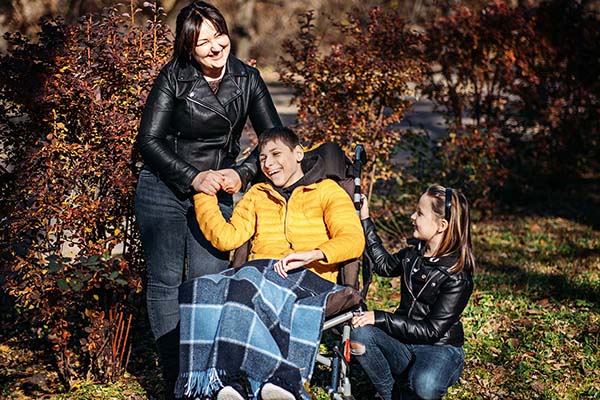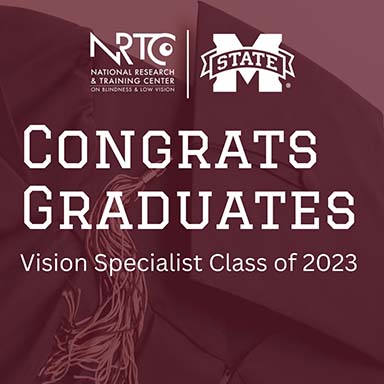4to24 App: For Parents of Deafblind Youth

The 4to24 app is a free mobile app created for parents of youth who are deaf-blind or have combined hearing and vision loss and additional disabilities. It covers ages 4 to 24, from preschool age into young adulthood. It focuses on reaching the youth's highest potential for independence, community engagement, and employment.
There are two versions of the 4to24 app for two distinct populations: (1) deafblind children and youth who have additional disabilities and (2) children and youth who are blind or have low vision. We previously presented information about the blind/low vision version, which can be found on our website.
The app provides information, activities, and links to resources to inform parents about skills and experiences that would be helpful for their child as he or she grows. For youth who are deaf-blind, app information focuses on building skills and as much independence as possible, with attention to topics like developing a communication system, planning for the future, and creating a profile of the youth's abilities and preferences to share with a support network. It offers suggestions for activities that are flexible for a broad range of ability levels.
Modules of information are delivered about once a month and are self-paced, so the information can be utilized when convenient. To sign up, download the app and create an account by registering as a new user. The app will ask for some basic information on your child's age and grade so that it can start you at the right level.
To learn more about the 4to24 app for parents of deaf-blind youth, visit our website.
Current Research Highlight: Job Search Skills Training via Videoconference
Job search skills training has proved to be an effective method for enhancing employment prospects among job seekers and positively impacting the well-being of individuals facing employment barriers. In one study, people who are blind or have low vision identified job search skills knowledge as a significant facilitator to employment, but a curriculum specific to this population was not available. The purpose of this project is to create and implement a job search skills training program with B/LV adults and evaluate its effectiveness.
Since we last featured this project in our newsletter, significant milestones have been achieved. Several key activities were completed, including the recruitment and formation of an advisory board, extensive edits to an existing successful curriculum and development of new material, pilot testing of the curriculum, and implementation of the efficacy study.
The advisory board played a crucial role in reviewing and improving the training curriculum. The pilot test demonstrated a positive reception of the training program, with participants appreciating the virtual environment's support and rapport-building capabilities.
In the efficacy study, 86 participants were randomly assigned to receive the intervention or to be in the control group. The intervention training was launched with three cohorts in December 2022, January 2023, and February 2023. Pre- and post-test surveys were administered as part of the evaluation process.
The team is currently working on collecting follow-up responses from participants and scoring participant's pre- and post-training resumes. Upcoming activities include completing the final round of data collection (1 12-month follow-up), analyzing the data to determine the effectiveness of the training, and sharing the results via journal articles and conference presentations. The project team will also develop a Resume Guide for individuals who are blind or have low vision, based on the most significant problems observed with participant resumes.
For more information about this research project, visit our research project webpage.
Training and Technical Assistance
New Online Courses
Understanding Cultural Differences and Their Impact on Service Delivery provides an overview of key considerations for providing vision rehabilitation services with cultural awareness, humility, and competence. This course emphasizes the importance of awareness of personal cultural orientations, understanding the effect culture has on interaction with consumers, and the impact of agency policies and culture on practice with diverse consumers. (2 credits CRC, ACVREP, and NBPCB)
All courses are available through our learning management system. For more information about our courses, visit our Frequently Asked Questions page.
Featured Resource
In celebration of January being Braille Literacy Month, the NRTC shares a featured course: Braille: What It Is and Why It Is Important. This course provides an overview of how the code works, the equipment used for reading and writing braille, and the barriers faced by those who want to learn and use braille.
Other NRTC News
Vision Specialist Program Updates

We are proud of the 13 graduates of our Vision Specialist in Vocational Rehabilitation program for their extraordinary work in completing this intensive program!
Additionally, we are pleased to announce that we have selected 14 professionals for the 2024 class from California, Missouri, Mississippi, Georgia, Florida, Virginia, Wisconsin, and North Carolina. In January, the Vision Specialist class of 2024 will begin their coursework, which includes four graduate-level courses to increase participants' knowledge about working with people who are blind or have low vision. Three of these courses are available to take individually and may be transferable to other universities' programs. More information about our courses and the program is available on our website.
Publications, Presentations, and Miscellanies
Publications
Cmar, J. L., & Steverson, A. (2023). Confidence and expectations among parents of and students with visual impairments. The New RE:view, 1(2), 51-67.
Moffitt, C. (2023). Using checklists as a vocational rehabilitation tool for employed consumers. Journal of Visual Impairment & Blindness, 117(5), 380-382.
McDonnall, M. C., Cmar, J. L., &McKnight, Z. S. (2023) College degree majors and associated earnings: Are there differences between people with visual impairments and the general population? Journal of Vocational Rehabilitation, 59(3), 263-272.
McDonnall, M. C., Sessler-Trinkowsky, R., & Steverson, A. (in press). Use of braille in the workplace by people who are blind. Journal on Technology and Persons with Disabilities.
McDonnall, M. C., Steverson, A., & Boydstun, J. (in press). Actual and preferred methods for learning to use assistive technology. Assistive Technology Outcomes and Benefits.
Upcoming Webinars
January 19 (2:00 pm CST) - Braille and Beyond!: With so many new and exciting things happening at NLS, it's a great time to get to know what's going on at the nation's free library for people with visual and print disabilities, along with how it might be a great resource for your clients. The presenter will give an overview of what NLS has to offer in audio and braille, as well as how to enroll with the NLS cooperating library in your state or territory, and share some book lists to get your clients started! To learn more and register, visit our event page.
Upcoming Presentations
McDonnall, M. C., & Sessler-Trinkowsky, R. (2024, January 26). Actual and preferred methods for learning to use assistive technology. ATiA - Assistive Technology Industry Association, Orlando, FL.
McDonnall, M. C., & Sessler-Trinkowsky, R. (2024, March 18-22). Use of braille in the workplace by people who are blind. CSUN, Anaheim, CA.